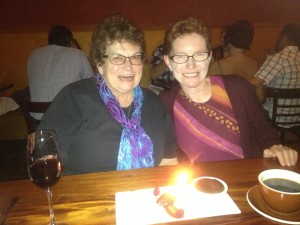So nearly 22 years after we met and almost 9 years to the day our marriage was invalidated, Sandy and I were married on August 30, 2013, at the foot of the surfer dude statue in Santa Cruz, an event officiated by our friend Dinah, witnessed by her spouse Gail, and accompanied by Sandy’s pastor friend David, as people waved and clapped from cars rolling by on West Cliff Drive.

Marriage Dinner
Friends can be forgiven for thinking we were already legally married. We did marry in San Francisco in 2004, but that marriage was invalidated several months later when it was determined that San Francisco can do many things but preempting state law is not one of them. I actually agree with that conclusion in the broader sense. But I also believe we wouldn’t be married today if Gavin Newsom hadn’t taken the law into his own hands. Those 4,000-some licenses are now historic relics, preserved by the city library, though I have ours as well, tucked into a folder.
Some friends wonder why we didn’t marry in 2008 (or assume we did marry), when same-sex marriage was briefly legal in California. We were living in Florida and knew our marriage wouldn’t be recognized by Florida. I didn’t anticipate how quickly things would change at the federal level. I am greatly pleased, but also amused in a devilish way, by the fact that two people can marry in a freedom state such as California and have their marriage recognized federally in their home state, however backward it may be.  If we had to return to a state that thought otherwise, the IRS, the Treasury Department, and the Department of Defense have our back.
People keep asking me if I feel different. I feel the same; it’s you folks who are different. As I wrote in my essay The Outlaw Bride, I never fully recognized the invalidation of our 2004 marriage. I have felt for nine years like a left-wing version of a Sovereign Citizen (except I paid taxes and obeyed laws because I’m prudent that way); I did not intellectually recognize the invalidation of our marriage. But the world caught up with us anyway when all kinds of people, from everyday citizens to Supreme Court justices, allowed themselves to evolve.
We had some discussion about what to call ourselves, and we decided on “spouses.” The term “partner” is one of those weak-coffee terms to use for people who can’t or don’t wish to marry. As for “wife,” we’re in agreement that while we’d like one,  neither of us want to be one. (Those of a certain generation may recall the feminist plaint, “I want a wife.” ) Younger women may be wondering what the fuss is about, but it is just too loaded a term for us. “Spouse,” meanwhile, has lovely foundation that recalls the commitment marriage represents, as the dictionary notes (plus a little celebration to boot):
Middle English, from Anglo-French espus (masculine) &espuse (feminine), from Latin sponsus betrothed man, groom & sponsa betrothed woman, bride, both from sponsus, past participle of spondēre to promise, betroth; akin to Greek spendein to pour a libation, Hittite šipant-
I admit I am a little concerned by the many friends who have wished us well with the caveat that they hope our marriage continues to be legally recognized. It’s my assumption that the engines of change have pushed us too far forward for backsliding to be possible, particularly as most reasonable people realize, if they have not done so before, that two people marrying, regardless of their gender, has absolutely no impact on the quality of their own lives, and that a world with more love and more commitment is better for everyone. Â There will be dissenters, with Justice Scalia as flag-bearer, but it is now clear that the reason so many states passed laws against same-sex marriage before it became legal is the fear that once marriage equality became a reality, it would be glaringly obvious what a non-issue this issue has been.
So, we are married. I cannot imagine my life these past 22 years without Sandy, and we are blessed to honor our love not only as a private matter between two people, but as full citizens in the eyes of our state and country.  Yet we have not given up on all outlaw aspects of our marriage. All love is a little bit outlaw in its magic and its extravagance. We love more generously than we think is possible, more powerfully than we realize, with a oceanic depth than can subsume us in grief in its loss. A friend sobbed on the phone to me as his wife lay dying that he didn’t understand why anyone married, because it hurt so much to lose the one you love. I was without words because I could not disagree. Therein lies the paradox of the greatest emotion we are privileged to experience.










Congratulations!
Mazel Tov! What a wonderful thing!
Congrats!
Congratulations